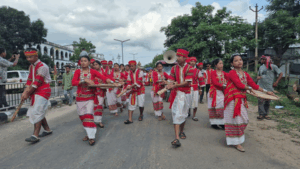Tripura CM Manik Saha announced a ₹1,400 crore World Bank loan under Externally Aided Projects for the all-round development of tribal areas, focusing on roads, health, water, and education, reaffirming the BJP government’s commitment to uplift Janajati communities.
Tripura Chief Minister Dr. Manik Saha on Thursday announced that the state government has secured a loan of ₹1,400 crore from the World Bank for the overall development of tribal-inhabited areas. The Chief Minister said the fund, taken under the Externally Aided Projects (EAP) scheme, will be used to improve infrastructure and living conditions in the Janajati (tribal) regions, with special emphasis on roads, electricity, water supply, health, and education.
Speaking at a government function held in Killa, Gomati district, CM Saha reiterated that the BJP-led government has made the holistic development of the tribal communities one of its topmost priorities.
“We want the overall development of the Janajati people. The BJP government does not want to do politics with the Janajatis. Development of the state is not possible without the upliftment of Janajati areas,” said the Chief Minister.
Major Budgetary Allocation for Tribal Areas
Highlighting the state’s financial commitment, CM Saha said that more than 40 percent of the 2025–26 budget has been earmarked for the development of tribal-inhabited regions. He pointed out that during the 2024–25 fiscal year, the state government had allocated ₹6,645 crore—approximately 39.06 percent of the total ₹27,000 crore budget—for the welfare of Janajati areas.
“For the current financial year (2025–26), around ₹7,149 crore has been allocated for the Tripura Tribal Areas Autonomous District Council (TTAADC),” he added.
The Chief Minister also mentioned that in the 2024–25 fiscal year, about ₹6,500 crore was spent on TTAADC areas, which cover nearly two-thirds of Tripura’s total land area.
Empowering Tribal Leadership
Since the BJP came to power in Tripura in 2018, several welfare initiatives have been introduced to empower tribal communities. CM Saha recalled that the state government had implemented an honorary allowance of ₹2,000 for tribal community leaders shortly after coming to power. Recently, the Cabinet decided to increase the allowance to ₹5,000, recognizing the crucial role of community leaders in grassroots governance and development.
“The government is taking all possible steps to ensure that our tribal brothers and sisters receive equal opportunities and support. We are committed to bridging the developmental gap between rural, urban, and tribal regions,” CM Saha stated.
Political Context and TTAADC Elections
The announcement comes at a politically significant time, as the Tripura Tribal Areas Autonomous District Council (TTAADC) elections are due early next year. The TTAADC administers nearly two-thirds of Tripura’s 10,491 sq km area and is home to over 12.16 lakh people, about 84 percent of whom belong to tribal communities.

The council has been governed since 2021 by the Tipra Motha Party (TMP), led by Pradyot Bikram Manikya Debbarma, the scion of Tripura’s former royal family. Both the TMP and the Indigenous People’s Front of Tripura (IPFT)—a BJP ally—are key political forces among the tribal population.
With elections approaching, the BJP government’s strong development pitch is seen as an effort to reinforce its commitment to tribal welfare and strengthen its presence in these politically crucial regions.
Tribal Population’s Crucial Role in Tripura Politics
Tripura’s tribal population forms nearly one-third of the state’s four million residents and plays a decisive role in state politics. Of the 60 Assembly seats, 20 are reserved for Scheduled Tribe (ST) candidates, making tribal support pivotal for any ruling party.
The Chief Minister’s announcement of a massive ₹1,400 crore World Bank-backed initiative is therefore not only a developmental milestone but also a strategic move aimed at ensuring long-term socio-economic transformation in tribal regions.
Experts say that projects under this fund are expected to include road connectivity upgrades, rural electrification, drinking water projects, healthcare infrastructure, and education facilities in remote tribal belts. These initiatives aim to bridge the rural-urban divide and create sustainable growth opportunities in the state’s hilly regions.
Commitment to Inclusive Growth
Reiterating his government’s vision, CM Saha said, “Our focus is to bring every section of society into the mainstream of development. The Janajati people are integral to Tripura’s culture and progress. The World Bank-funded projects will help in building a self-reliant and developed tribal Tripura.”
| Also Read: Tipra Motha, CM Saha hold fresh talks on Tiprasa Accord |
With the combination of World Bank assistance, state budgetary support, and policy focus, Tripura appears poised to accelerate its tribal development agenda—setting a model for inclusive governance in the Northeast.













